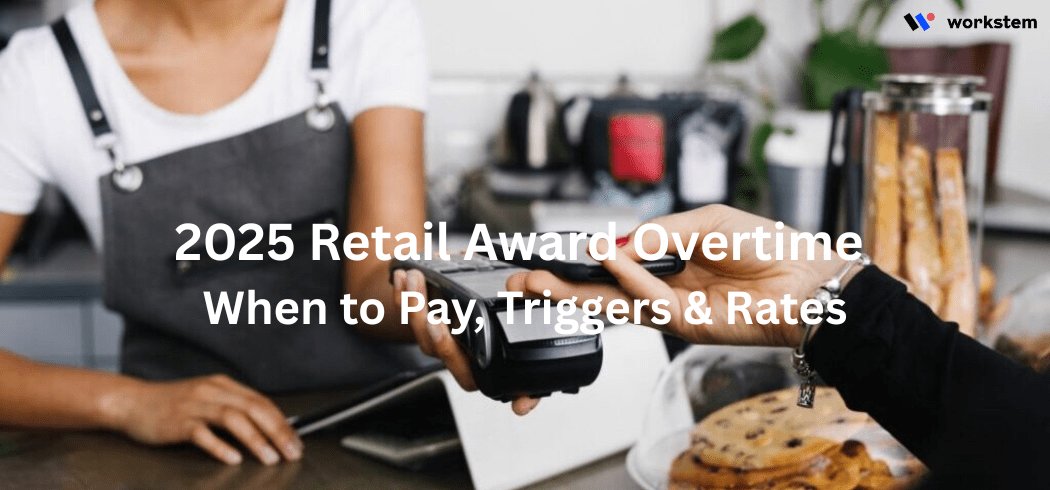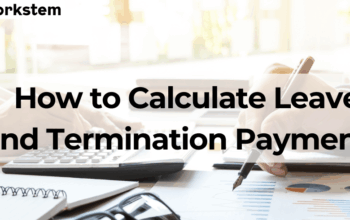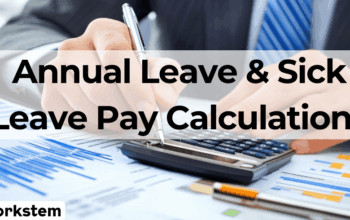Under Australia’s General Retail Industry Award MA000004 or the Retail Award, overtime pay applies whenever employees work beyond their ordinary hours or rostered shifts.
What is Overtime?
Overtime refers to the additional hours worked by an employee beyond their regular or contracted hours. In the context of the General Retail Industry Award [MA000004] or the Retail Award, overtime pay is required whenever employees work beyond their ordinary hours or rostered shifts. This includes hours worked outside the defined span of ordinary hours, excess hours in a day or week, and work on weekends or public holidays.
For example, under the Retail Award, ordinary hours are defined as:
- Monday to Friday: 7:00 AM – 9:00 PM
- Saturday: 7:00 AM – 6:00 PM
- Sunday: 9:00 AM – 6:00 PM
Any hours worked outside these spans are considered overtime and must be compensated at the appropriate overtime rates.
Common Retail Award Overtime Triggers
- Outside ordinary hours: Any work beyond the Retail Award’s span of hours is overtime. E.g. An evening retail shift extending past 9:00pm on a weekday (or past 6:00pm on Saturday) incurs overtime pay.
- Exceeding contracted hours: Full-time staff are entitled to overtime once they work more than 38 ordinary hours in a week, or outside their roster. Part-time employees get overtime for hours beyond their agreed (or varied) hours.
- Daily limits: Generally, retail shifts longer than 9 hours trigger overtime. Casuals can work up to 9 ordinary hours per day (11 hours on one day) before overtime rates apply. For example, a casual worker working 12 hours in one day must be paid overtime on the 10th–12th hour.
- Weekend and Public Holidays: Any Sunday hours or work on a public holiday is paid at overtime rates. (These are actually penalty rates, but Retail Award treats them as higher Overtime rates. ) For instance, Sunday work is paid at double time (200%) and public-holiday work at 250%.
Each of the above conditions “triggers” overtime under the Award’s overtime provisions. Full-time, part-time and casual employees must all be paid the appropriate overtime rates when these triggers occur.
What are the overtime rates under the Retail Award?
When overtime is triggered, rates are as follows (all expressed as a percentage of the employee’s base Retail Award rate of pay):
- Monday–Saturday: First 3 overtime hours at 150% of base pay; any additional hours at 200%. (E.g. a 10-hour Monday shift with 2 hours overtime would pay those 2 hours at 150%.)
- Sunday: All overtime hours at 200%.
- Public Holidays: All overtime hours at 250%.
Casual employees receive these rates plus their 25% casual loading. In effect, casual overtime rates are 175% (first 3h Mon–Sat), 225% (beyond 3h Mon–Sat), 225% (Sunday) and 275% (public holiday). (Note: ordinary time on weekends also attracts penalty rates; the above table shows overtime rates.)
To Wrap Up
Workstem’s automated award interpretation and payroll system ensures your rostering and pay calculations always follow the Retail Award rules. It automatically applies the correct overtime rate whenever a shift falls outside ordinary hours or a worker exceeds their regular hours. By using Workstem, small businesses and payroll teams can avoid manual errors and stay up-to-date with penalty and overtime rates under the Retail Award.
How Does Workstem Help?
Simplify your payroll process and ensure accurate pay rates with Workstem’s automated payroll system. Our pre-built modern award interpretation software covers 122+ awards and 34 EBAs, and keeps you up-to-date with penalty rates and other award entitlements.
Choose between our Standard and Advanced plans, and enjoy a range of benefits such as Fair Work compliance, an employee self-service App, and custom rule set. We have integrated our system with Xero and NetSuite as well to bring you a complete HR SaaS solution for your business.
Book a free demo with our payroll experts. Experience the efficiency and accuracy of Workstem today!
FAQs About Retail Award Overtime Payroll
Q: When must overtime be paid under the Retail Award?
A: Overtime is payable whenever an employee works beyond their ordinary hours. In practice, this means:
-
Hours over 38 in a week for full-time employees.
-
Hours outside rostered span (e.g., after 9pm weekdays, after 6pm Saturdays).
-
Beyond agreed part-time hours.
-
Casuals incur overtime after 9 hours in a day (11 hours on one day).
Q: What overtime rates apply?
A: The Award specifies:
-
Time-and-a-half (150%) for the first 3 overtime hours (Mon–Sat).
-
Double time (200%) thereafter.
-
Sunday overtime is at 200%.
-
Public holiday overtime is at 250%.
-
Casuals get these rates plus an additional 25% (i.e., 175%, 225%, 225%, 275% respectively).
Q: Are weekend or public holiday hours always overtime?
- A Sunday shift is paid at 200% (retail overtime rate).
- A public holiday shift is paid at 250%.
(These are commonly called penalty rates, but under the Retail Award, they fall under overtime pay.)
Q: How does Workstem handle Retail Award overtime?
A: Workstem’s award engine automatically flags overtime triggers and applies the correct rates. It interprets Retail Award rules so that any extra hours (after hours, weekends, etc.) are paid at the Retail Award overtime rates, ensuring full compliance without manual calculations.
Read more:
General Retail Industry Award Guide [MA000004]
Updated Retail Award Rates 2024: What You Need to Know
Case Study 1: Revealing the Difference Between Woolworths’ EBA and Retail Award








